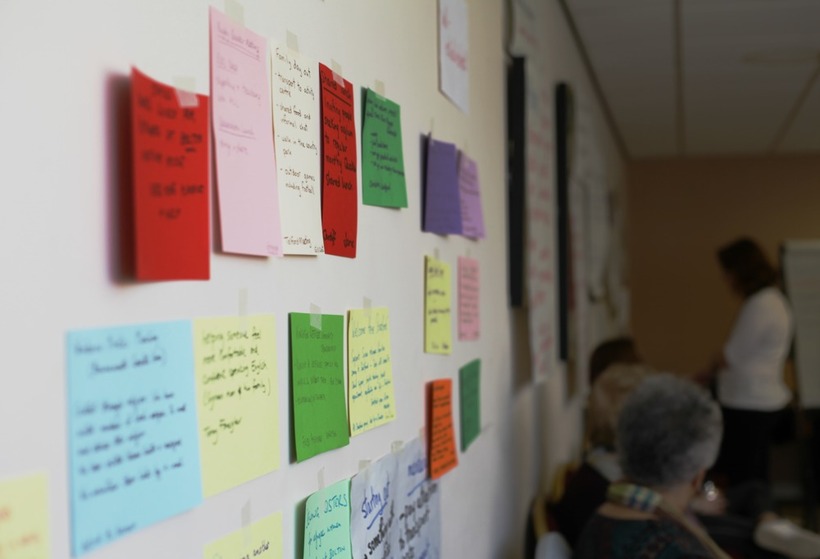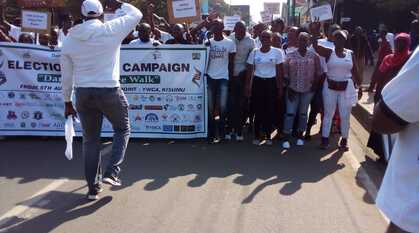A new approach to living out our faith in action
Robert Almond, co-clerk of Quaker Peace & Social Witness Central Committee, reflects on developing a new strategy for Quaker work in the world.

Over the last month since the local elections I've been reflecting on a comment made several times by several Labour politicians, that "we need to spend less time talking to ourselves, and more time talking and working with those in the communities we seek to represent".
Do I agree with this? As Friends, our way, our instinct, is to engage widely and our discernment is frequently strengthened by this. Yet Quaker discipline also asks that we listen. Fully, quietly and with our hearts open. Our world however, seems to move ever quicker. We frequently hear things from many different places, and sometimes I worry we're not yet skilled enough with the new online ways of meeting to fully open out the quiet spaces we need for listening and discernment.
Steering the work
The background to this reflection, is knowing personally the time – daily and weekly, that's been committed in careful discernment to the work developing our Quaker Peace & Social Witness strategy (PDF). Effort that's given freely by the many Friends serving on committees to steer and support work that for the large part we ask others to do in our name. This is frequently demanding as well as joyous, and it's important that we seek to guide it well. It's important too that we uphold both those discerning the path, and those we ask to walk along it.
We are at a challenging – and I hope an exciting time. Over the past 18 months, Quaker Peace & Social Witness (QPSW) Central Committee has been working hard to discern the direction, the priorities, the approach to the programme of work that we take over the next 5 years. Some speak of this as the work of our charity, but I sit more comfortably with the phrase 'living out our faith in action'. This speaks more clearly to me, and I believe for the majority of Friends is a fundamental part of why we are drawn to the witness and worship of the Society of Friends.
Greater focus on fewer things
In preparing this new strategy, Central Committee has at times struggled. We know that all that we do is important and valued, and we know the care has been put in to supporting and leading these programmes of work. Yet alongside this, we are acutely aware that there is much that we can't do, and much that we could do better if we had more resources. We have been challenged too by the question of whether we might achieve more if we did things differently.
The new strategy (PDF), and recent minutes on how we see this being delivered (PDF), are available online. But over the last few weeks it has become clear there is more to be said and discussed about what has informed this discernment. These are three things that try to crystallise this:
Firstly, we know it is a huge challenge to adequately do enough across all our concerns and testimonies – we think we can achieve more, by giving greater focus to fewer things. That this should grow from what Friends can bring to this that is uniquely Quaker.
The journey to build a just and peaceful world is long, yet we are called to respond to immediate challenges. We need to speak out, even when we might want to look more to the horizon than to the landslide that has blocked our path. This needs our work to be more flexible. To shrink and grow, but also to respond to what we believe is true, that our vision for the future is for fundamental changes as well as to resist detailed and more immediate wrongs.
We are a body of Friends, 20,000 strong, worshipping in around 400 Meetings across Britain. There are many things we can do collectively, and better by using the talents of our highly dedicated, capable and professional staff team.
Yet we sense there is both a yearning for, and the potential to do more growing and supporting the witness of Friends within our local communities. There is scope too, to draw more on the specialist knowledge, direct commitment and lived experience of Friends to also speak out with authority on Quaker concerns.
From the leadings of Friends
It is perhaps this last point that is the most challenging. Much can be taken forward in our corporate witness, collective actions carried out in our name. But these actions, have frequently grown from the leadings of individual Friends – testing concerns within their local and area meetings. Fermented in those 'quiet processes and small circles' in which 'transforming events take place'.
Earlier this week I had one of those conversations with someone who isn't a Quaker, asking me to summarise in a few words what it is that Quakers did differently. I suspect I'm not the only Friend who finds this difficult…
I said a few things about not having priests and what this meant for our ministry and approach to faith. I added that our approach meant a different approach to leadership. That we sought to trust that discernment by Friends tasked to take on certain roles was better than having appointed or elected post-holders. It was the end of an evening, and I also confessed I was frequently a 'bad Quaker' and that like many people I didn't always live to the principles that Quakers and I profess!
I'm finishing with these comments, because I know there will be parts of the proposed changes that affect some well cherished and important QPSW programmes. But before rising to challenge (and of course a challenge may be right), I hope that individual changes be seen in the context of the whole vision and approach.
Although the path to the world we seek isn't fully lit, my hope is that we might see light in the mountains ahead.
Read more about the work of Quaker Peace & Social Witness Central Committee


